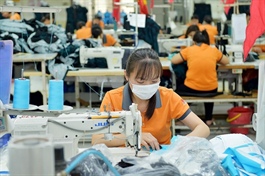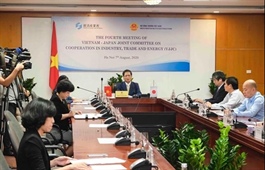HCM City industrial production falls sharply
HCM City industrial production falls sharply
HCM City’s index of industrial production for the first seven months of the year declined by 5.5 per cent year-on-year due to the impact of the COVID-19 pandemic, according to its Department of Industry and Trade.

Metal production, wood and bamboo and wooden products, machinery and equipment, pre-fabricated metal products, and beverages saw declines.
Many of Viet Nam’s trading and investment partners have their borders closed, and so businesses have to scale down production, the department said.
Local businesses also explained that industrial production has been facing pressure from imports.
To avoid negative growth in industrial production during the rest of the year, breakthrough solutions and policies to enable businesses to stabilise and expand production and develop markets are needed, Nguyen Phuong Dong, the department’s deputy director, said.
The city’s overland exports rose by 5.8 per cent to US$24.7 billion in the seven months, but shipments to markets with which Viet Nam has free trade agreements decreased.
For instance, exports to Europe were worth only $2.74 billion, a year-on-year fall of 7 per cent.
China remained the largest market at over $6 billion, a 44.7 per cent rise, followed by the US and Japan.
Domestic demand has reduced significantly.
The city’s total retail sales of goods and services in the period were only VND718.1 trillion ($30.8 billion), down 3.8 per cent year-on-year. Sectors that saw strong declines were accommodation and dining services (down 45.1 per cent) and tourism (74.9 per cent).
The manufacturing industry’s inventory index rose by 5.5 per cent, with sectors having high inventories including electrical equipment manufacturing (68.3 per cent), chemicals and pharmaceuticals (50.3 per cent) and metal production (43 per cent).
In the current context, to maintain production and regain growth momentum, businesses need to take advantage of opportunities in both the domestic and export markets, according to experts.
In the domestic market, businesses must focus on improving product quality, being more innovative in developing their products and building their brand names, they said.
In export markets, enterprises need to effectively exploit advantages brought by free trade agreements (FTAs), including the EVFTA, which has taken effect since the beginning this month, to boost exports; and to capitalise on opportunities brought by FTAs, they must be ready to meet requirements such as rule of origin and intellectual property regulations, they added.


























